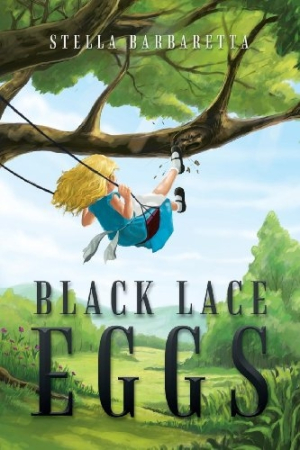Black Lace Eggs
Barbaretta captures beautifully the innocence of youth, the ugliness of life, and the resiliency that lies within us.
Childhood is not always fun and games. As a young girl’s life becomes marked with experiences better left to adults in Black Lace Eggs, we see a strength and courage emerging in her that, along with faith, will carry her through into womanhood.
Six-year-old Marley Gayle Kellerman is a spunky, friendly, imaginative young person. And, let’s not forget to mention, a tad mischievous too. The second of four daughters, she is her father’s delight, but to her mother, a woman who simmers with an underlying rage, Marley is a target. It’s not that Marley does anything wrong, though she is a bit headstrong at times. There seems to be another reason for her mother’s anger.
Marley and Freddie have been best friends and farm neighbors since his family moved nearby one year ago. They have always played together, and he would do anything to make her happy. But when a wonderful old man, Lucas Middleton, comes to live with Freddie’s family and Marley takes a liking to him, Freddie’s insides start to churn.
To Marley, getting in trouble, studying Sunday school lessons, falling for a boy from church named JC, and hanging out with her best girlfriend Chele all make for a pretty normal and exciting life. Until Lucas goes missing. It is then that Marley’s world begins to change.
A mother’s inner turmoil, family struggles, secret affairs, and murder are heavy themes in this drama that easily draws on the readers’ compassion and grace to accomplish the end result: forgiveness.
Black Lace Eggs is not all seriousness and moral lessons, however. Readers can expect a good dose of humorous relief and will often find themselves laughing out loud. For instance, when old Aunt Laura pulls out her latest creation of homemade underpants, badly stitched, and announces proudly, “You give me your waist sizes, and I’ll make all of you some,” readers will no doubt react similarly to Aunt Laura’s family members.
Stella Barbaretta has an obvious talent for creating engaging, familiar characters and setting appropriate scenes to depict specific time periods, as she has done for this 1950s story. A few examples are Marley’s fanciful feelings for Gene Autry, the first times she sees a commercial for Puffed Rice, and mentions of Tarzan and the Ed Sullivan Show. Barbaretta also shares her faith in God without ever being preachy or forceful; she instead uses it as a tool to conquer the trials of life.
Black Lace Eggs is an excellent book, and though the cover is beautifully illustrated and speaks perfectly to a specific scene, it also, upon first glance, appears to be a book for children. It is not. Black Lace Eggs, with its mature content and at times choice language, is for young adults and up. A more age-appropriate and theme-based cover would likely gather a larger volume of readers seeking this genre.
Reviewed by
Tammy Snyder
Disclosure: This article is not an endorsement, but a review. The publisher of this book provided free copies of the book and paid a small fee to have their book reviewed by a professional reviewer. Foreword Reviews and Clarion Reviews make no guarantee that the publisher will receive a positive review. Foreword Magazine, Inc. is disclosing this in accordance with the Federal Trade Commission’s 16 CFR, Part 255.

